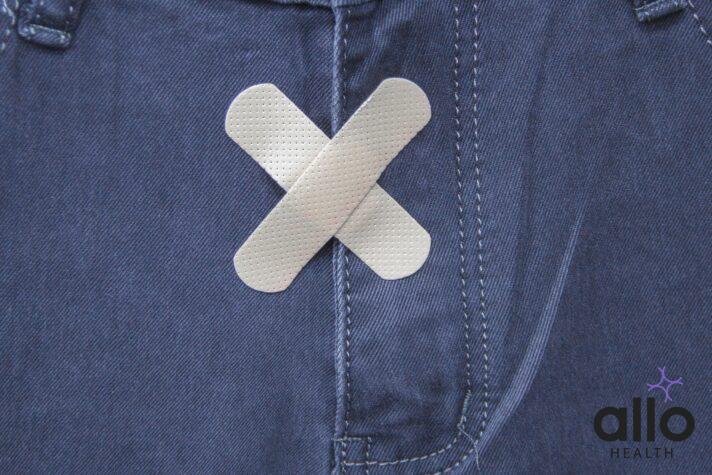Amitriptyline In Erectile Dysfunction

Allo Health is dedicated to personalized well-being, offering support and trusted information tailored to individual health goals. The platform emphasizes human-generated content, led by a distinguished medical team of experts, including physicians and sexual health specialists. Their commitment to credibility involves rigorous fact-checking, authoritative research, and continuous updates to ensure accurate, up-to-date information. Allo Health's unique approach goes beyond conventional platforms, providing expert-led insights and a continuous commitment to excellence, with user feedback playing a crucial role in shaping the platform's authoritative voice.

Dr. Raj. R holds an undergraduate medical degree from the Philippines, and has a bachelors background in Psychology. His experience working in the field of urology further brought his interest forward in working towards his passion of understanding the science of attraction, intimacy, sex and relationships. A key motto he practices by remains unprejudiced and non-judgemental care.
Why This Was Upated?
Our experts continually monitor the health and wellness space, and we update our articles when new information became available.
Updated on 11 April, 2024
- Article was updated as part of our commitment to diversity, equity, and inclusion.

"The following blog article discusses alternative medicine practices and their potential effects or benefits. However, it is important to note that the information provided is for general educational purposes only and should not be considered as medical advice or a substitute for professional guidance from a qualified healthcare professional. Before considering any alternative medicine practices or treatments, it is recommended to consult with a healthcare professional.
Book consultation
Alternative medicine encompasses a wide range of practices that may not have undergone rigorous scientific evaluation or received widespread acceptance within the medical community. The effectiveness, safety, and appropriateness of alternative medicine practices can vary significantly depending on the individual, their specific medical conditions, and other factors.
It is important to approach alternative medicine practices with caution and skepticism. Some practices may carry potential risks or interact with existing medical treatments. A healthcare professional can provide guidance based on your medical history, evaluate the available evidence, and offer informed advice regarding the potential benefits and risks of alternative medicine practices.
Individuals with specific medical conditions, allergies, or taking medications should exercise particular caution when considering alternative medicine practices. Some practices may have contraindications or adverse effects, and it is essential to discuss these potential concerns with a healthcare professional before pursuing any alternative treatments."
Embarking on the journey of overcoming erectile dysfunction (ED)? Erectile dysfunction (ED) is a common condition that affects many men worldwide, making it difficult for them to achieve and maintain an erection during sexual intercourse. This condition can significantly impair a man’s sexual performance, cause stress and anxiety, and negatively impact his self-esteem. Fortunately, there are several treatment options available to manage ED. One of these options is Amitriptyline. Explore the role of amitriptyline, a tricyclic antidepressant, in the realm of ED treatment.
Understanding the Causes of Erectile Dysfunction
- Introduction:
- Erectile dysfunction (ED) is a common condition affecting men’s ability to achieve or maintain an erection.
- Understanding the underlying causes is crucial for effective treatment.
- Physical Factors:
- Vascular Concerns:
- Reduced blood flow to the penis can result from conditions like atherosclerosis or high blood pressure.
- Neurological Conditions:
- Disorders affecting the nervous system, such as multiple sclerosis or Parkinson’s, can contribute to ED.
- Vascular Concerns:
- Hormonal Imbalance:
- Low levels of testosterone, a key male hormone, may lead to erectile concerns.
- Hormonal disorders like hypothyroidism can also play a role.
- Psychological Factors:
- Stress and Anxiety:
- Mental health concerns, including stress and anxiety disorders, can negatively impact sexual performance.
- Depression:
- Mood disorders often coincide with ED, creating a cycle of emotional and physical challenges.
- Stress and Anxiety:
- Lifestyle and Behavioral Factors:
- Smoking:
- Tobacco use damages blood vessels, restricting blood flow to the penis.
- Alcohol and Substance Abuse:
- Excessive consumption can interfere with both physical and psychological aspects of sexual function.
- Obesity and Lack of Exercise:
- Sedentary lifestyle and obesity contribute to ED by affecting cardiovascular health.
- Smoking:
- Common Medications and Treatments:
- Certain prescription drugs, such as tetracyclic antidepressants/ other antidepressant drugs, blood pressure medications, and anti-anxiety drugs cause erectile dysfunction.
- Treatments for prostate cancer, including surgery and radiation, can impact erectile function.
- Age-related Factors:
- Aging itself can contribute to ED, with increased prevalence as men get older.
- However, age-related changes are often compounded by other health factors.
- Identifying the root causes of ED is crucial for personalized treatment plans.
- A comprehensive approach addressing physical, psychological, and lifestyle factors can often lead to successful outcomes.
What is Amitriptyline and how does it work?
- Amitriptyline Overview:
- Amitriptyline is a tricyclic antidepressant (TCA) used to treat various mental health conditions.
- It belongs to the class of drugs that alter neurotransmitter levels in the brain to alleviate symptoms.
- Mechanism of Action:
- Serotonin and Norepinephrine Reuptake Inhibition:
- Amitriptyline increases serotonin and norepinephrine levels by inhibiting their reuptake in the brain.
- Elevated levels of these neurotransmitters contribute to mood regulation.
- Histamine Blockade:
- The medication has antihistamine properties, potentially causing sedation and aiding in insomnia treatment.
- Alpha-Adrenergic Blockade:
- By blocking alpha-adrenergic receptors, amitriptyline helps reduce symptoms of conditions like anxiety disorders and neuropathic pain.
- Serotonin and Norepinephrine Reuptake Inhibition:
- Indications for Use:
- Depression:
- Amitriptyline is commonly prescribed to treat major depressive disorder.
- Neuropathic Pain:
- It may be used for conditions such as diabetic neuropathy or post-herpetic neuralgia.
- Migraine Prevention:
- Amitriptyline is sometimes prescribed to reduce the frequency and intensity of migraines.
- Depression:
- Dosage and Administration:
- Individualized Treatment:
- Dosage varies based on the patient’s condition, response, and tolerance.
- Oral Administration:
- Typically taken in tablet form, often once daily at bedtime to minimize daytime sedation.
- Individualized Treatment:
- Potential Side Effects:
- Common Side Effects:
- Dry mouth, blurred vision, constipation, and drowsiness are frequent but often transient.
- Serious Side Effects:
- Rare but can include cardiac effects, especially in overdose situations.
- Common Side Effects:
- Precautions and Considerations:
- Interactions:
- Amitriptyline may interact with other medications, and caution is advised when combined with certain drugs.
- Monitoring:
- Regular monitoring of mood and overall well-being is essential during treatment.
- Interactions:
- Discontinuation and Withdrawal:
- Tapering:
- Abrupt discontinuation may lead to withdrawal symptoms; therefore, a gradual tapering of the dose is often recommended.
- Tapering:
- Consultation with Healthcare Provider:
- Individualized Approach:
- Patients should consult their healthcare provider for personalized advice, considering their medical history and unique circumstances.
- Individualized Approach:
Understanding amitriptyline’s mechanism of action and its diverse applications underscores its role in mental health and pain management, but its usage requires careful consideration and supervision by healthcare professionals.
How Effective is Amitriptyline in Treating Erectile Dysfunction?
- Overview: Amitriptyline, a tricyclic antidepressant, is explored for its potential in treating erectile dysfunction (ED).
- Mechanism: The drug affects neurotransmitters, including serotonin and norepinephrine, influencing blood flow and arousal.
- Psychological Factors: Amitriptyline’s effectiveness may be tied to its impact on psychological aspects, such as reducing anxiety or depression, which can contribute to ED.
- Side Effects: Common side effects include drowsiness and dizziness, potentially affecting sexual performance.
- Individual Responses: Responses to amitriptyline can vary; some may experience improved sexual function, while others may face increased challenges.
- Consultation: Patients should consult healthcare professionals before using amitriptyline for ED, considering individual health, medication interactions, and potential risks.
- Alternative Treatments: Given the complexity of ED, alternative treatments, lifestyle changes, or specific ED medications may be explored for more targeted solutions.
- Caution: The use of amitriptyline for ED should be carefully monitored and adjusted under medical supervision to minimize risks and optimize potential benefits.
- Holistic Approach: Combining medical interventions with lifestyle changes and addressing underlying concerns offers a comprehensive strategy for managing ED.
Dosage and Administration of Amitriptyline for Treating Erectile Dysfunction
- Initial Dose: Begin with a low dose, typically 25 mg orally at bedtime.
- Gradual Titration: Increase by 10-25 mg weekly based on response and tolerance.
- Usual Maintenance: 50-100 mg daily, adjusted as needed.
- Individualized Approach: Tailor dosage to the patient’s specific condition and medical history.
- Bedtime Administration: Best taken before bedtime to minimize daytime drowsiness.
- Regular Monitoring: Assess regularly for efficacy and side effects.
- Caution in Elderly: Start with lower doses due to increased sensitivity.
- Consider Comorbidities: Adjust dosage for patients with cardiovascular or hepatic concerns.
- Consultation with Healthcare Provider: Always seek professional guidance for personalized recommendations.
- Avoid Abrupt Discontinuation: Taper gradually to prevent withdrawal symptoms.
- Potential Drug Interactions: Be aware of interactions with other medications; consult a healthcare professional.
- Monitoring for Adverse Effects: Stay vigilant for side effects such as sedation, dry mouth, and constipation.
- Patient Education: Educate patients on the importance of adherence and reporting any concerning symptoms promptly.
Benefits and Risks of Using Amitriptyline for Erectile Dysfunction
Benefits of Using Amitriptyline for Erectile Dysfunction:
- Potential positive impact on psychological factors contributing to erectile dysfunction.
- Off-label use has shown promise in select cases.Risks and Considerations:
- Limited conclusive evidence on its efficacy for treating erectile dysfunction.
- Common side effects include drowsiness, dry mouth, and weight gain.
- Serious potential side effects such as heart arrhythmias and interactions with other medications.
- Consultation with a healthcare professional is essential before considering amitriptyline for this purpose.
Possible Side Effects of Amitriptyline for Erectile Dysfunction Treatment
- Amitriptyline Overview:
- Commonly prescribed for depression, anxiety, and migraines.
- Off-label use for treating some cases of erectile dysfunction (ED).
- Potential Side Effects:
- Sexual Dysfunction:
- Reports of decreased libido.
- Difficulty achieving or maintaining erections.
- Anticholinergic Effects:
- Dry mouth.
- Blurred vision.
- Constipation.
- Weight Gain:
- Common side effects, impacting metabolic health.
- Weight gain may exacerbate ED.
- Drowsiness:
- Sedative properties.
- Can affect sexual arousal and performance.
- Cardiovascular Effects:
- Potential for orthostatic hypotension.
- May impact overall cardiovascular health.
- Sexual Dysfunction:
- Consultation with Healthcare Provider:
- Essential before starting or discontinuing treatment.
- Individual responses vary; tailored advice crucial.
- Consideration of Alternatives:
- Discuss potential ED treatments without significant sexual side effects.
- Collaborative decision-making for holistic well-being.
Understanding the potential side effects of Amitriptyline for ED treatment is vital, emphasizing personalized medical guidance and exploring alternative options.
Amitriptyline in comparison to other natural remedies for treating erectile dysfunction
- Amitriptyline Overview:
- Tricyclic antidepressants are used for various conditions, including neuropathic pain.
- Limited evidence on its direct role in treating erectile dysfunction (ED).
- Natural Remedies for ED:
- Lifestyle Changes:
- Regular exercise and a balanced diet can positively impact ED.
- Stress management and sufficient sleep contribute to overall sexual health.
- Lifestyle Changes:

- Herbal Supplements:
- Ginseng, L arginine, and Yohimbe are commonly used.
- Varying degrees of scientific support; caution needed due to potential side effects.
- Acupuncture:
- Acupuncture may improve ED by enhancing blood flow.
- Herbal Supplements:
- Amitriptyline vs. Natural Remedies:
- Amitriptyline addresses underlying concerns like neuropathic pain but lacks a specific ED focus.
- Natural remedies often emphasize holistic lifestyle changes and have fewer reported side effects.
- Considerations:
- Individual response to treatments varies.
- Consultation with a healthcare professional is crucial before starting any regimen.
- Amitriptyline may have a role in certain cases, but natural remedies focus on overall health and may be preferable due to their holistic approach. Always seek professional advice.
Comparison of Amitriptyline with Other ED Medications
- Amitriptyline Overview:
- Tricyclic antidepressants are used for various conditions.
- Common ED Medications:
- Sildenafil (Viagra):
- Widely prescribed PDE5 inhibitor.
- Rapid onset, effective for short-term ED.
- Tadalafil (Cialis):
- PDE5 inhibitor with longer duration (up to 36 hours).
- Offers flexibility in timing.
- Vardenafil (Levitra):
- Similar to sildenafil, quicker onset.
- Effective in treating ED.
- Sildenafil (Viagra):
- Mechanism of Action:
- Amitriptyline:
- Tricyclic antidepressant acting on neurotransmitters.
- Limited evidence on its direct impact on ED.
- PDE5 Inhibitors:
- Enhance blood flow to the penis.
- Directly address physiological aspects of ED.
- Amitriptyline:
- Efficacy and Response Time:
- Amitriptyline’s effects on ED are less studied and may vary.
- PDE5 inhibitors are known for rapid and reliable response.
- Side Effects and Considerations:
- Amitriptyline:
- Potential side effects include drowsiness and weight gain.
- Careful consideration of overall health is required.
- PDE5 Inhibitors:
- Generally well-tolerated but may cause headaches or facial flushing.
- Contraindications with certain medications.
- Amitriptyline:
- Patient Profiles and Recommendations:
- Amitriptyline:
- Considered for patients with coexisting depression.
- Individual response may vary.
- PDE5 Inhibitors:
- Suitable for various ED cases, especially those related to vascular concerns.
- Consultation with healthcare professionals is crucial for personalized recommendations.
- Amitriptyline’s role in treating ED is not as well-established as PDE5 inhibitors.
- Individual patient characteristics and preferences play a crucial role in medication selection.
- Educating patients on potential side effects is crucial for informed decision-making. Healthcare providers play a key role in ensuring patients understand the nuances of using amitriptyline for ED.
- Amitriptyline:
When to Consider Amitriptyline as an ED Treatment Option?

- Amitriptyline, a tricyclic antidepressant, may be considered for ED in certain cases.
- Evaluate when psychological factors contribute to erectile dysfunction.
- Consult with a healthcare professional to determine if Amitriptyline is suitable for your specific situation.
- Discuss potential risks, benefits, and alternative treatments before considering Amitriptyline.
- Monitor for side effects and adjust dosage under medical supervision.
- Remember that individual responses to medication vary, and a personalized approach is crucial.
- While amitriptyline addresses specific concerns like neuropathic pain, natural remedies focus on overall health. From lifestyle changes to herbal supplements, understanding the holistic approach is crucial
How to Obtain a Prescription for Amitriptyline for ED Treatment?
- Schedule an appointment with a healthcare professional
- Discuss erectile dysfunction (ED) symptoms openly
- Provide detailed medical history, including current medications
- Request an evaluation for amitriptyline suitability
- If deemed appropriate, receive a prescription
- Follow dosage instructions and attend follow-up appointments for monitoring and adjustments.
Most Asked Questions
-
Can Amitriptyline cause Erectile Dysfunction?
Learn about potential side effects, including its impact on sexual function and strategies to manage this issue.
-
Is Amitriptyline a common culprit for sexual dysfunction?
Understand the prevalence of ED with Amitriptyline use, exploring factors influencing its occurrence.
-
How does Amitriptyline affect libido and arousal?
Delve into the mechanisms of how Amitriptyline may influence sexual desire and arousal in individuals.
-
Are there alternatives to Amitriptyline for those concerned about ED?
Explore alternative medications or approaches for managing conditions without compromising sexual function.
-
Can adjusting the dosage mitigate Amitriptyline-induced ED?
Gain insights into dosage adjustments and their potential impact on reducing or preventing Erectile Dysfunction associated with Amitriptyline use.







































